Attendance
The Strategic Approach
Beacon Primary School adopts the 5 Foundations of Effective Attendance Practice framework, this is modelled on the work of Professor Katherine Weare. The emphasis is on developing a school culture and climate which builds a sense of connectedness and belonging to ensure all children can attend school and thrive. The approach ensures we prioritise building solid working relationships with children / parents prior to any escalation. The staged approach we use ensures we identify triggers early that can lead to poor attendance issues such as mental health issues, lack of trust, communication and relationship breakdowns and the possible lack of networking opportunities both internal (in-school) and external (external agencies). The Foundations framework has most recently been reviewed by the Department for
Education. The Foundations framework received an excellent report following the four-day review.
The Foundations approach is an excellent example of best practice; there are very clear and detailed systems and procedures in place to manage absence and attendance consistently
(Michelle O’Dell DFE Attendance Advisor March 2022)
Aims of the strategy
- Increase school Attendance and reduce Persistent Absence to meet set targets.
- Ensure Attendance is well managed within the school, with the appropriate level of resources allocated.
- Enable the school to make informed use of Attendance data to target interventions appropriately, focusing on the key demographic groups highlighted in the 2022 DFE paper.
Objectives
- create an ethos within the school in which good attendance is recognised as the norm and every child/young person aims for excellent attendance.
- make attendance and punctuality a priority.
- set focused targets to improve individual attendance and whole school attendance levels.
- embed the 5 Foundations of Effective Attendance Practice framework which defines agreed roles and responsibilities and promotes consistency in carrying out designated tasks with respect to promoting attendance and punctuality.
- record and monitor attendance and absenteeism and apply appropriate strategies to minimise absenteeism.
- develop a systematic approach to gathering and analysing relevant attendance data.
- provide support, advice and guidance to; parents, children and young people and develop mutual cooperation between home and the school in encouraging good attendance and in addressing identified attendance issues.
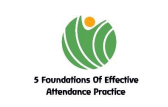
Beacon Primary School follows the 5 Foundations of Effective Attendance Practice framework. The approach is evidence-informed and completely child-centred. Each Foundation is supported by 5 Key Performance Indicators, these are used to ensure the school can embed the Foundations framework and understand the strategic direction regarding attendance improvement.
The framework allows the school to understand the whole school approach to supporting and improving attendance, this is completely aligned to our Beacon School Values.
We create welcoming environments to allow all children to gain a sense of belonging and ultimately achieve academically through regular school attendance.
The school policy is translated into practise through the processes and systems we follow. The escalated approach supports children at each stage, parents who do not engage with support understand why, at times, we must follow this process.
All staff receive attendance training to support the whole school approach, they understand their role in improving attendance. Certain staff are identified to engage in specialist training to continue to support families and children who work with external partners.
We use data information to support children as this allows us to understand the groups, and individuals, who require specific programmes of intervention. Reviewing each programme allows us to understand the effectiveness of support and change what is not working.
Finally, we train and support all staff to understand the ‘root cause’ of concerns. Staff use the wider curriculum to allow all children to feel valued and accept themselves. We celebrate attendance success and ensure children returning from long absence receive a planned transition.

The school has a fully embedded ethos in which excellent school attendance is expected, developed and nurtured. The escalated approach to supporting attendance is built on foundations of belonging and connectedness.
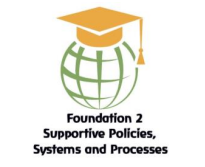
The approach to improving attendance is built on clear policies, systems and processes. This ensures continuous and sustainable improvement drives attendance practice. The attendance policy is understood by all stakeholders and allows the school to set, and maintain, high expectations to improve the culture of attendance.

The school prioritises developing a team of attendance experts, with a shared vision and core purpose. The Attendance Leader delivers bespoke training to support all staff to fully understand their role in improving attendance. External partnerships support attendance improvements through a multi-disciplinary approach for identified children and families
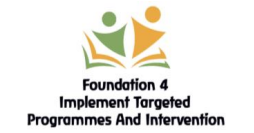
Data information and analysis direct resources proactively towards key demographic groups and identified individuals. The expert use of data analysis informs decision making at all levels. The attendance process ensures the Attendance Leader understands the reason for attendance concerns, these barriers can then be successfully supported and removed.
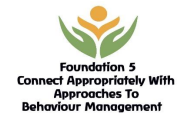
Connecting and belonging drives the school approach to supporting attendance. All staff are supported to understand ‘deeper roots’ regarding poor attendance concerns. The school has developed, and embedded, an effective rewards system to further drive attendance improvements and celebrate success.
DFE: Working Together To Improve Attendance 2022
From September 2022 the DFE: Working Together To Improve Attendance paper will replace all previous guidance on school attendance except for statutory guidance for parental responsibility measures. The Secretary of State has committed to it becoming statutory when parliamentary time allows (this will be no sooner than September 2023).
The table below identifies how the 5 Foundations of Effective Attendance Practice will underpin the DFE 2022 paper in meeting the summary of expectations.
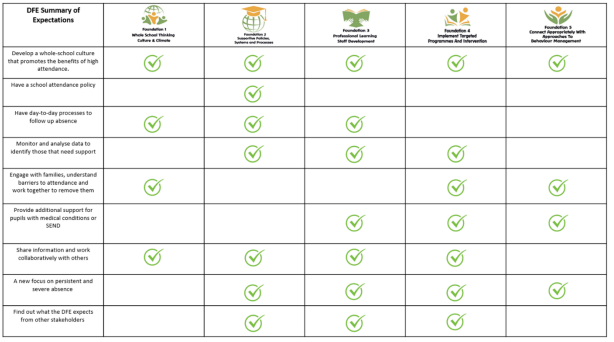
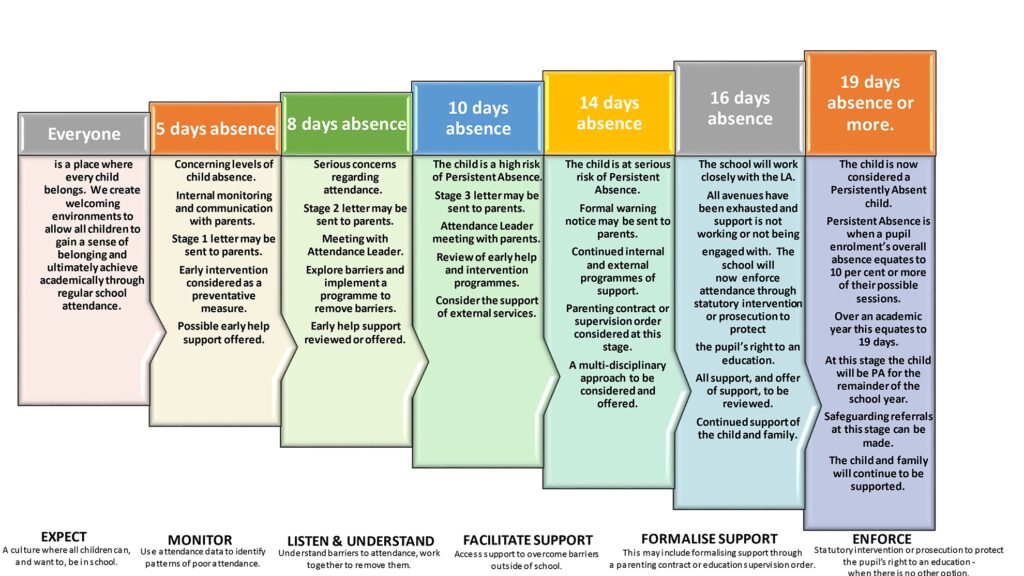
School Attendance and Penalty Notices
Information for parents and carers
Your child’s education is really important. Regular attendance at school increases your child’s chance of getting good qualifications and a good job.
Children need to attend school regularly to benefit from their education.
Missing out on lessons leaves children vulnerable to falling behind. Children with poor attendance tend to achieve less in primary and secondary school.
The Law
You are responsible for:
- Ensuring your children receive full-time education
- Their regular and punctual attendance at school
As the parent, you are committing an offence if you fail to make sure that your child attends school regularly and the absence is unauthorised by the Headteacher, even if they are missing school without your knowledge.
If you fail to ensure your child’s regular attendance at school the Local Authority may issue a penalty notice or instigate legal proceedings for an offence under section 444 of the Education Act 1996.
What is regular attendance?
In April 2017, the Supreme Court held that attending school “regularly” means attendance in accordance with the rules prescribed by the school and not “sufficiently frequent attendance“. This means that a child must attend school on every day that the school requires him or her to do so and failure to do this may lead to the commission of an offence
What counts as an unauthorised absence?
- Any absence from school that the school has not given permission for
- Truancy from school, with or without parent’s knowledge
- Parentally-condoned absence (i.e. you know your child is absent from school and you do nothing about it)
- Delayed return from a period of leave of absence
- Arriving late at school after the register has closed
Can I take my child out of school for a holiday during term time?
You should not expect your child’s school to agree to an absence for a holiday in term time.
In 2013 amendments to the Pupil registration regulations removed all reference to family holidays and made clear that Headteachers should not approve any absence unless in exceptional circumstances.
The fundamental principles for defining ‘exceptional’ are rare, significant, unavoidable and short.
If you feel there are exceptional circumstances why your child needs to be absent from school, you should apply in advance, by writing to the Headteacher explaining clearly the dates and reasons you are requesting leave of absence.
It is at the discretion of the Headteacher whether or not to authorise the absence. If the school refuses a request for leave of absence and the child is still taken out of school this will be recorded as an unauthorised absence.
What is a Penalty Notice?
A Penalty Notice is an alternative to prosecution and can be issued when there have been 10 sessions of unauthorised absence (the equivalent of 5 days consecutive or otherwise) over two consecutive half terms. A separate Penalty Notice can be issued for each parent per child.
You have to pay a fine but you do not have to appear in Court. You also have to make sure that your child’s attendance at school improves.
Payment of a Penalty Notice enables parents to discharge potential liability for conviction.
Is a warning given?
The school will send you a formal letter of warning telling you that a Penalty Notice may be issued. This warning letter will also include details of your child’s absences. If you receive a warning letter this is an opportunity for you to work with the school to improve your child’s attendance and avoid the need to issue a Penalty Notice.
Your child must have no further unauthorised absences from school from the date of the letter. If your child’s unauthorised absence continues and reaches 10 sessions (5 school days) or more, a Penalty Notice will be issued.
There is no limit to the number of times a formal warning may be issued. This depends on each individual case.
However, the school is not required to send a warning letter where the absence is due to an unauthorised holiday during term time.
What are the costs?
£60 if you pay within 21 days of receipt of a Penalty Notice or £120 if you pay after this but within 28 days. (Per parent, per child).
Is there an appeal process?
There is no right of appeal by parents against a Penalty Notice.
What happens if I don’t pay?
If you don’t pay in full within 28 days, Bolton Council is required to commence proceedings in the Magistrates’ Court under Section 444 of the Education Act 1996 for the original offence of failing to ensure the regular attendance of your child.
If proven this can attract a range of fines up to £1,000 and/or a range of disposals such as Parenting Orders or Community Sentences depending on individual circumstances
Can I be prosecuted if I pay the Penalty Notice but my child is still missing school?
Not for the period included in the Penalty Notice – payment discharges your liability in this respect. A prosecution might be considered for further periods of poor attendance not covered by the Penalty Notice, depending on your circumstances.
The Local Authority can also prosecute parents for non-attendance without issuing a
Fixed Penalty Notice.
If poor school attendance persists the Local Authority may also consider prosecution under Section 444 (1A) of the Education Act 1996, which can carry a fine of up to £2500 and/or up to three months imprisonment.
What can I do?
Ensure your child attends school regularly and arrives on time. Lateness can be very disruptive for the class and for your child.
Make sure your child understands that you do not approve of them missing school. If you suspect your child is not happy in school you should contact the school as soon as possible.
Take an interest in your child’s education, ask about their day, and praise and encourage achievements at school.
Can I get help if my child is not attending regularly?
If you are experiencing problems with your child’s attendance at school, it is really important that you work closely with the school to resolve the matter. Alternatively, for further guidance and support, you can contact:
Child Employment and Enforcement Officer
Early Intervention Service
2nd Floor, BASE
Marsden Road
Bolton
BL1 2PF
Tel: 01204 338173
Every lesson counts. Improving attendance, raising attainment
The legal definitions of ‘parent’ are:
- Any natural parent, whether married or not
- Any parent who, although not a natural parent, has parental responsibility as defined in the Children’s Act (1989)
- Any person who, although not a natural parent, has care of a child or young person
Going to school regularly is important for your child’s future. Parents are responsible for making sure their children receive full-time education. Talking to your child and their teachers could help solve any problems if your child does not want to go to school.
Regular school attendance
Good attendance shows secondary schools and/or future potential employers that your child is reliable.
Beacon Primary school records details of all children’s attendance and absence from school. We do so at the beginning of morning and afternoon sessions. If your child is absent, you must inform the school immediately.
The school will record the absence and the Local Authority will receive this information for each child. The Department of Education also receives annual attendance data for the school.
Your responsibilities as a parent
By law, all children of compulsory school age must receive a suitable full-time education. For most parents, this means registering their child at a school. Although some parents choose to make other arrangements to provide a suitable, full-time education.
Once your child is registered at Beacon Primary School, the parent is legally responsible for making sure they attend on a regular basis. If your child does not attend school on a regular basis, you could be subject to a fine or be prosecuted in court.
How to prevent your child from missing school
You can help prevent your child missing school by:
- making sure they understand the importance of good attendance and punctuality.
- taking an interest in their education, ask about schoolwork and encourage them to get involved in school activities.
- discussing any problems they may have at school and letting their teacher or principal know about anything serious.
- not letting children take time off school for minor ailments, particularly those which would not prevent you from going to work.
To avoid disrupting your child’s education, you should arrange appointments and outings:
- after school hours.
- at weekends.
- during school holidays.
- You should not expect Beacon Primary School to agree to your child going on holiday during term time.
Support on school attendance
A child’s school attendance can be affected if there are problems with:
- Bullying.
- Housing or care arrangements.
- Transport to and from school.
- Work and money.
If your child starts missing school, you might not know there is a problem. If there is a problem, please approach their teacher or the school attendance team.
Beacon Primary School’s approach to supporting and improving school attendance






